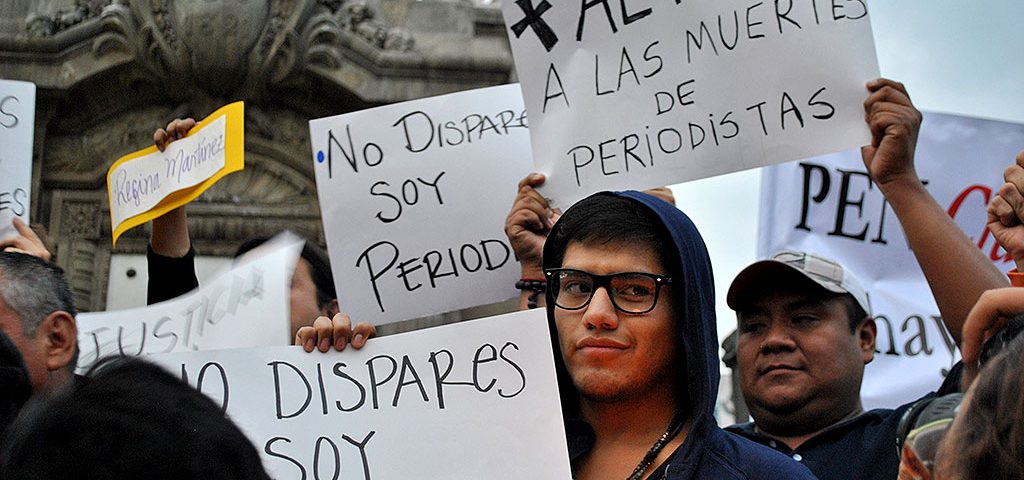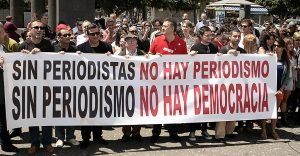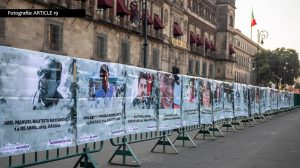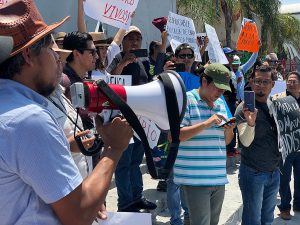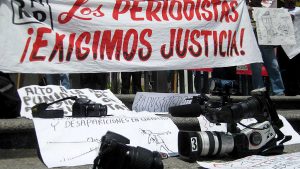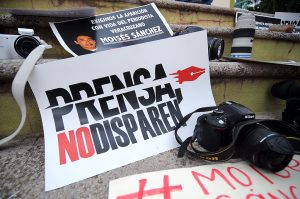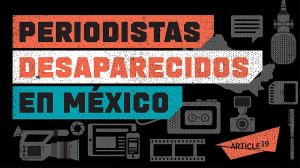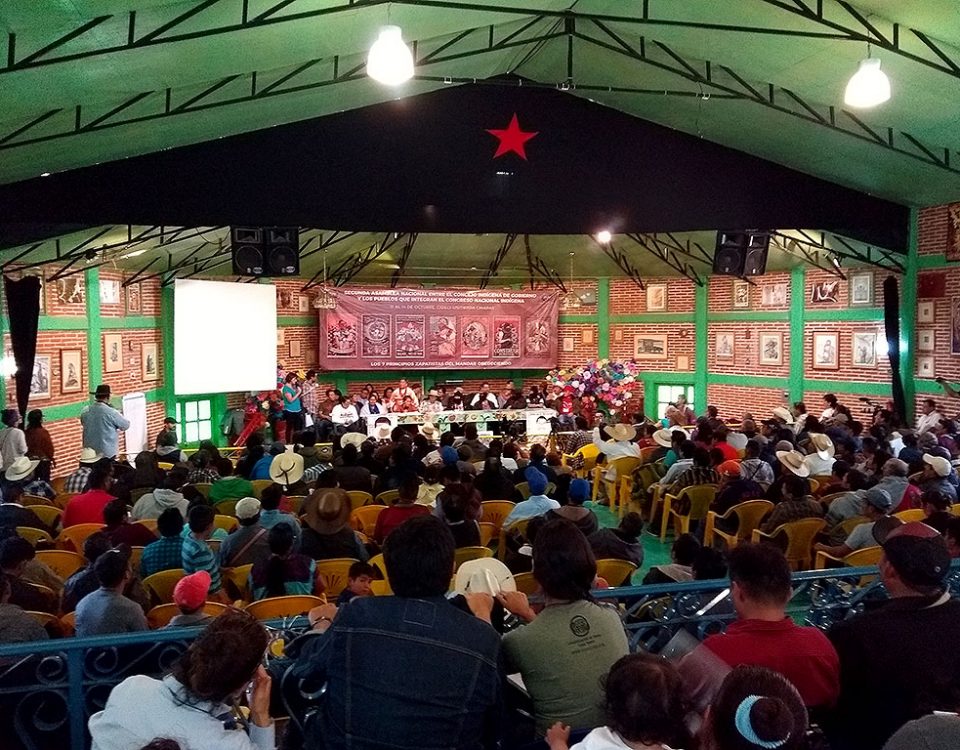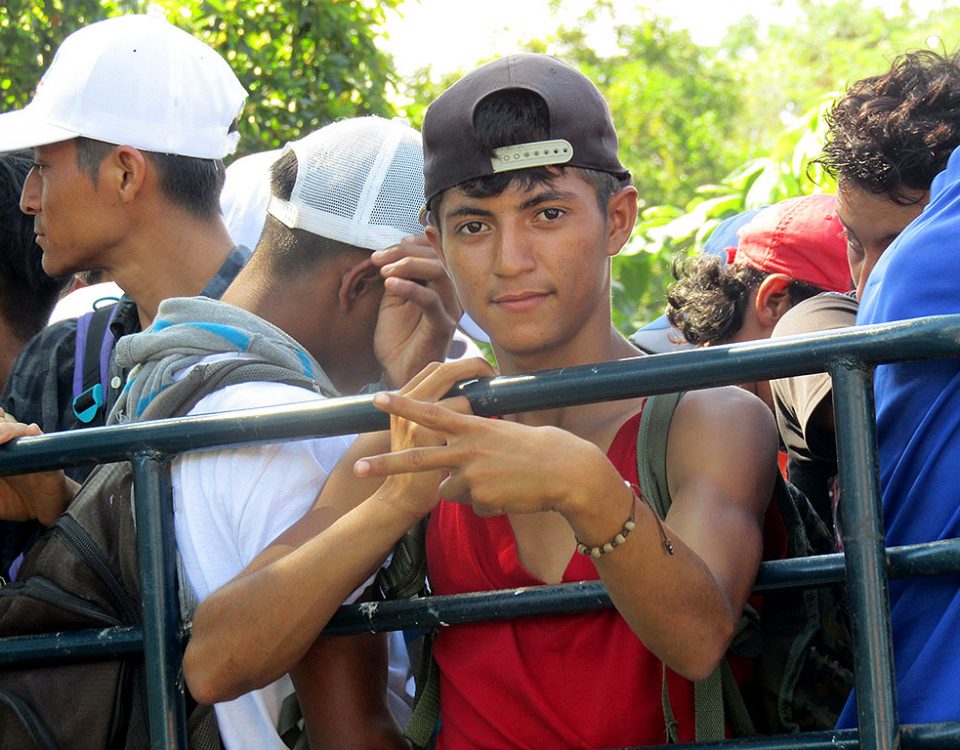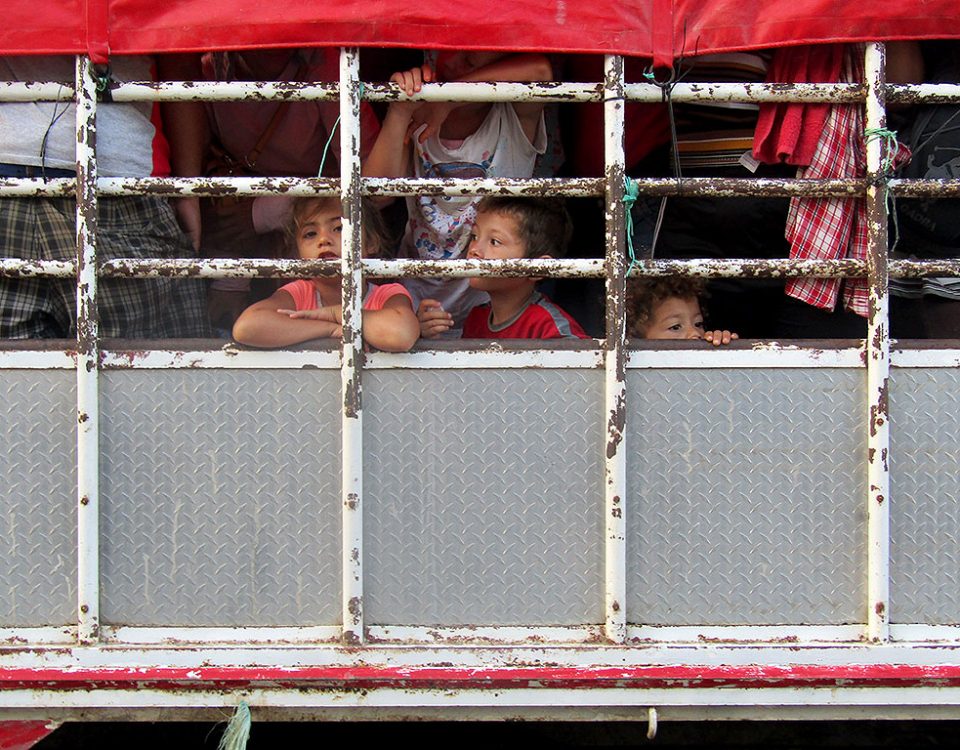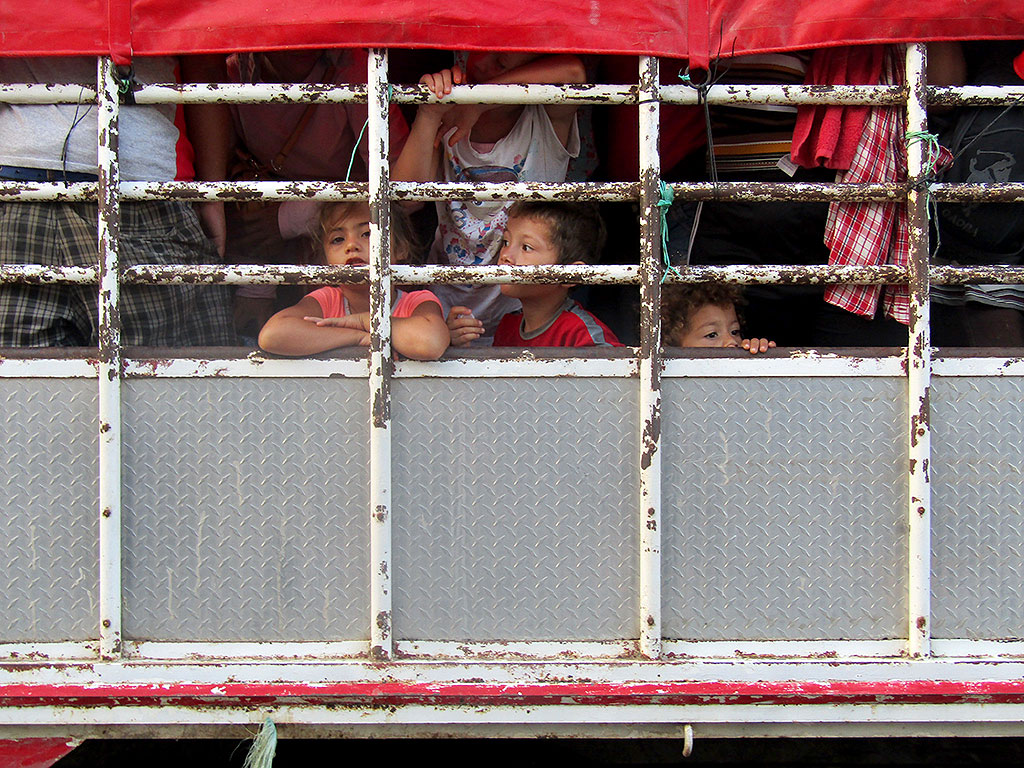
LATEST: “Migrant Exodus” poses new and old challenges alike for human rights in Mexico
11/12/2018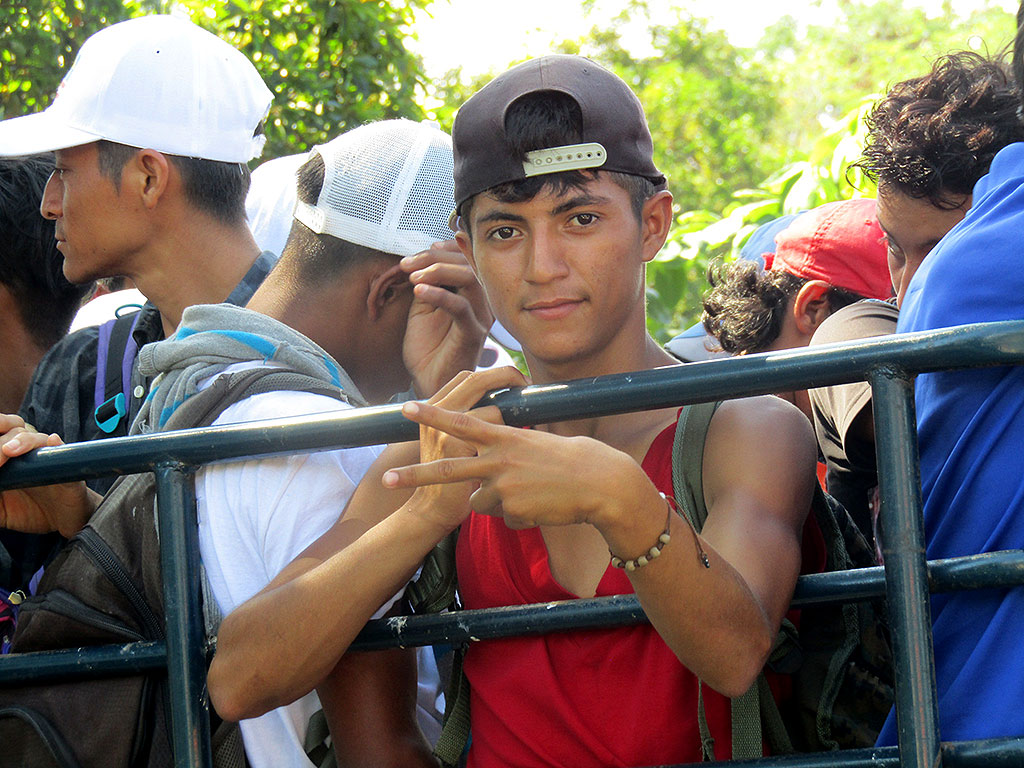
ARTICLE: Migrant Exodus – the Honduran crisis that forced thousands to head for the US
11/12/2018In the Middle East you die if you are caught in combat, a bombing, or if you fall into the hands of terrorists. In Mexico, they go to your house for you.”
September 21, 2018, Chiapas – Journalist Mario Leonel Gomez Sanchez, correspondent for El Heraldo de Chiapas, was murdered in Yajalon.
Months before, he had filed a complaint to the State Attorney General’s Office regarding death threats against him. The Office of the United Nations High Commissioner for Human Rights in Mexico (UNHCHR) condemned the murder and emphasized that: “Violence against journalists does not cease. The main way of preventing these attacks is an efficient and thorough justice administration, which takes into account the type of investigation related to journalistic work, with a context analysis that does not rule out intellectual authorship.”
October 24th, 2018 – Gabriel Soriano Kuri, broadcaster and worker of the state news station Radio y Television de Guerrero (RTG), died by gunfire after the company truck he was traveling in was attacked. The murder occurred while returning from a broadcast of the report of Governor Hector Astudillo on his third year in office in Acapulco. According to the initial version released by the prosecution, the reason for the attack could have been an argument with another motorist who was armed. With his death, Soriano became the seventeenth reporter murdered in Mexico to date this year.
The organization for freedom of expression Articulo 19 called for an investigation into the possible political motives in the case as “a day after the homicide of Soriano a dismembered body was found in La Poza neighborhood, located in the Diamond Zone of Acapulco with a message that (…) says the following: “Here I am respected, asshole government, continue to have dealings with the CIDA (Acapulco Independent Cartel) and that’s how everyone will end up, be they journalists or government, they will suck my cock”. Similarly, Articulo 19 stated that if the murder had political motives, “this homicide would be an unprecedented event as it would confirm that drug trafficking is using the press as cannon fodder to politically pressurize public authorities to achieve their ends. This would signal the beginning of a new form of organized crime violence against journalism.”
Two examples that illustrate the analysis of Freedom House, an organization based in Washington, regarding the current situation in Mexico: “Impunity and violence limit freedom of expression in Mexico. Journalists and media, to a lesser extent, suffer an escalation of attacks that in the last decade have increased steadily, to the point where the country has been in first place in the world for these murders, disappearances, and aggressions against journalists for several years. Weak justice institutions are overwhelmed and the aggressors are still in the streets, without punishment for their crimes. The response of the Mexican State has been uncertain and poor. And it does not offer guarantees for the journalist to work with freedom and independence. Self-censorship is imposed, because there are actual powers that threaten their lives. But also because public officials intimidate and persecute them.”
General security crisis for journalists in Mexico
In June 2018, the rapporteurs on freedom of expression of the Inter-American Commission on Human Rights (IACHR) and the United Nations (UN) presented a joint report during the session of the Human Rights Council in Geneva, Switzerland, following their visit to Mexico at the end of 2017.
They noted that the country “is going through a deep security crisis that seriously affects the human rights of the population. One of the central aspects of the crisis is the weakening of the rule of law and local governance that has spread in the country” and that “intimidating practices against the press persist, such as direct attack or discretion in state advertising.”
During the administration of Enrique Peña Nieto (2012-2018) some acts by the government attempted to intimidate and limit media coverage through, for example, the use of Pegasus spyware as well as the approval of the Internal Security Law.
In June 2017, The New York Times magazine published a report entitled “Using Texts as Lures, Government Spyware Targets Journalists and Their Families” in which they reported that Mexican journalists and activists had been spied on with software acquired by the government, called Pegasus. Pegasus infiltrates phones and other devices to monitor any detail of a person’s daily life through their cell phone: calls, text messages, emails, contacts and calendars. The spyware can use the phone’s microphone and camera to carry out surveillance. The company said they sell this application “exclusively to governments on the condition that it is only used to combat terrorists or criminal groups and drug cartels” and that only a federal judge can give authorization to monitor private communications when demonstrating that you have a well-based case to make that request.
Likewise, in December of 2017 Articulo 19’s regional office for Mexico and Central America expressed its concern about the approval of the Internal Security Law (LSI), and pointed out that the right to information is violated through Article 9 of the law, which indicates that the information generated by the application of this law will be considered National Security, therefore, any information that may arise from the activities carried out by authorities in their internal security functions is considered secret.
The recommendations in the UN rapporteurs’ report on freedom of expression include repealing the Law of Internal Security, conducting an independent investigation on the use of Pegasus spyware, showing political will to reinforce security and protection measures for reporters, ensuring effective cooperation and coordination between the federal and state levels to do so, counteracting media monopolies, particularly in broadcasting and satellite and cable television, and expanding the access of indigenous peoples to community broadcasting.
Although the Supreme Court of Justice of the Nation (SCJN) declared the Internal Security Law unconstitutional in mid-November 2018, many other concerns raised by the rapporteurs in their report remain unanswered.
Attacks on journalists in Mexico: a worrying review
Articulo 19’s latest report Simulated Democracy, Nothing to Applaud states that of the aggressions against reporters committed during the current six-year term of office, only 8% were allegedly committed by members of organized crime while 48% were committed by public officials. “Mexico is still the most dangerous country to practice journalism in Latin America and the levels of violence faced by those seeking to report are only comparable to countries in a situation of declared war, such as Syria. Thus, in 2017 we documented 507 attacks against journalists and 12 murders. During the administration of Enrique Peña Nieto 1,986 attacks have been registered.”
Briefly reviewing Mexico’s recent history, “in the last 64 years, at least 289 journalists have been killed in situations that could be linked to their journalistic activity,” according to the news outlet Sin Embargo.
During the last three presidential terms of office, Articulo 19 has documented the murders of 120 journalists in Mexico, all possibly related to their journalistic work. Of the total, 111 are men and nine are women. Of these murders, 48 occurred during the current term of President Enrique Peña Nieto: 11 in Veracruz, the state with the highest number of murders during this presidency.
Another cruel way to exert violence against journalists is disappearances. Mexico officially recognizes that there are more than 35 thousand people missing. Among them, Articulo 19 has counted 24 journalists who have disappeared in the last 15 years.
It is also worth highlighting another form of aggression- raids on journalists’ houses or media offices in which they work. In addition to what can be stolen, incidents of this type tend to reinforce the perception of helplessness among reporters. In one of the most recent examples in April, unknown individuals raided the office of the news agency Quadratin Guerrero, in Acapulco, from which they stole a hard drive, two computers, and other documents.
Another way of threatening media personnel which has been booming is through social media. For example, in May, Juan Alberto Carmona Contreras, reporter with the online media Piñero de la Cuenca, in Tuxtepec, Oaxaca, received death threats through Facebook.
A case that has been widely covered was the judicial harassment against Carmen Aristegui who was fired from MVS in 2015 after publishing an investigation on the “White House”, owned by President Enrique Peña Nieto’s wife, a case documenting a conflict of interest. It is also noteworthy that in the case of the Pegasus software, one of the people monitored was the Aristegui’s son when he was still a minor.
According to the Statistical Report updated to September 2018, the Special Prosecutor’s Office for the Attention of Crimes Committed against Freedom of Expression (FEADLE) currently has 54 pending cases where women are the direct victims of the reported crimes. They represent 21.8% of total cases in process. The states where more crimes are committed against women who work in professions related to freedom of expression are Mexico City, Quintana Roo, and Veracruz. The crimes committed against these women range from threats, abuse of authority, illegal deprivation, injuries, homicide, robbery, intimidation, damage to property, etc.
Impunity and limited government responses leave journalists defenseless
A report by the Committee to Protect Journalists (CPJ) showed that while impunity in Mexico was high for all crimes, in the case of attacks and crimes against journalists, it was almost absolute. “In a generalized context of violence, journalists are targeted because they expose themselves more than other citizens, because they investigate and are also exposed to a lack of rights,” the CPJ said.
In October, the National Justice Procurement Conference took place in Oaxaca City, where attorneys and prosecutors from all over the country met. The Approved Protocol for the Investigation of Crimes Committed against Freedom of Expression was passed. Important civil organizations such as Reporters Without Borders, the Committee for the Protection of Journalists, CIMAC, and Articulo 19, consider that even though it is an important step, we should remember that “this protocol, although a necessary tool for the procurement of justice and combating impunity in crimes committed against freedom of expression, requires a model of autonomous and independent enforcement of justice with respect to the federal branch, purging the personnel of ministerial institutions, and appropriate training for ministerial officials. It is also necessary to provide human, financial, and material resources to FEADLE and to the prosecutor’s offices or local unites that deploy these investigations.”
In addition, since August, alerts have been issued regarding the absence of funds necessary for the functioning of the Mechanism for the protection of human rights defenders and journalists, which was created in 2012 in light of the attacks and threats against these sectors. The Office of the United Nations High Commissioner for Human Rights (UNHCHR) emphasized that the lack of funding represents “a risk for the 959 current beneficiaries of the Mechanism; it would also mean that new people at risk could not receive protection.” It affirmed that, “budget insufficiency is contrary to the institutional effort that the Mexican State has made to face the grave situation of human rights defenders and journalists in the country.” Legislators and the National Commission for Human Rights (CNDH) also urged the federal government to transfer resources to prevent the defenders and journalists from remaining unprotected.
Another source of restriction of freedom of expression: the allocation of state advertising
In November of 2017, the Supreme Court of Justice of the Nation (SCJN) granted an injunction to the organization Articulo 19, forcing Congress to regulate public resources destined for propaganda, which exceeded two billion dollars since 2013. The SCJN considered that the absence of regulation encourages an arbitrary use of the budget in the area of social communication, which “constitutes a mechanism of restriction or indirect limitation of freedom of expression, clearly outlawed by the Constitution (…) encourages the social communications spending policy to channel fiscal resources towards media in support of the Government’s positions and denies access to these resources – or simply threatens to restrict it – to media that are critical of the Government’s policies.”
In April 2018, the Senate of the Republic approved a Social Communication Law that aims to respond to this ruling. This Law is also known as #LeyChayote (by the name of the bribe that can be given to journalists and the media). The UN High Commissioner for Human Rights in Mexico said of the approved text: “By adopting the Social Communication Law without taking into account international human rights standards, a historic opportunity has been lost to correct the malpractices that exist around the allocation of State Advertising in Mexico.” For its part, the Free Media Collective composed of journalists, media, civil, academic, and business organizations, regretted that the text only legalized political propaganda disguised as information without achieving substantive regulation. It denounced that the government continues to allow “arbitrary and discretional use of the distribution of state advertising and generates censorship of the media and critical journalists.”
Urgent pending issues for the incoming government
The data and examples attest to the seriousness of the situation. In the words of Salvador Mora Velazquez, Faculty of Political Science of the National Autonomous University of Mexico (UNAM) “To injure a journalist is to attack freedom of expression” because “it negatively affects the quality of democracy in this country, threatening the quality of information that citizens receive.”
“To strengthen freedom of expression in Mexico, the new government should highlight the role of journalism as a “watchdog of democracy””, Edison Lanza, Special Rapporteur for Freedom of Expression of the IACHR stated in mid-November.
Various declarations and international treaties, such as the American Declaration on Human Rights and Duties of Man, the American Convention on Human Rights, the Universal Declaration of Human Rights, and the International Covenant on Civil and Political Rights, all of them international instruments of which Mexico is part, recognize that freedom of expression is a fundamental right. The difficulty is when it comes to putting them into practice as different interests come into play. Mexico is facing several challenges in this regard, another pending issues that the incoming government will take on in December.

